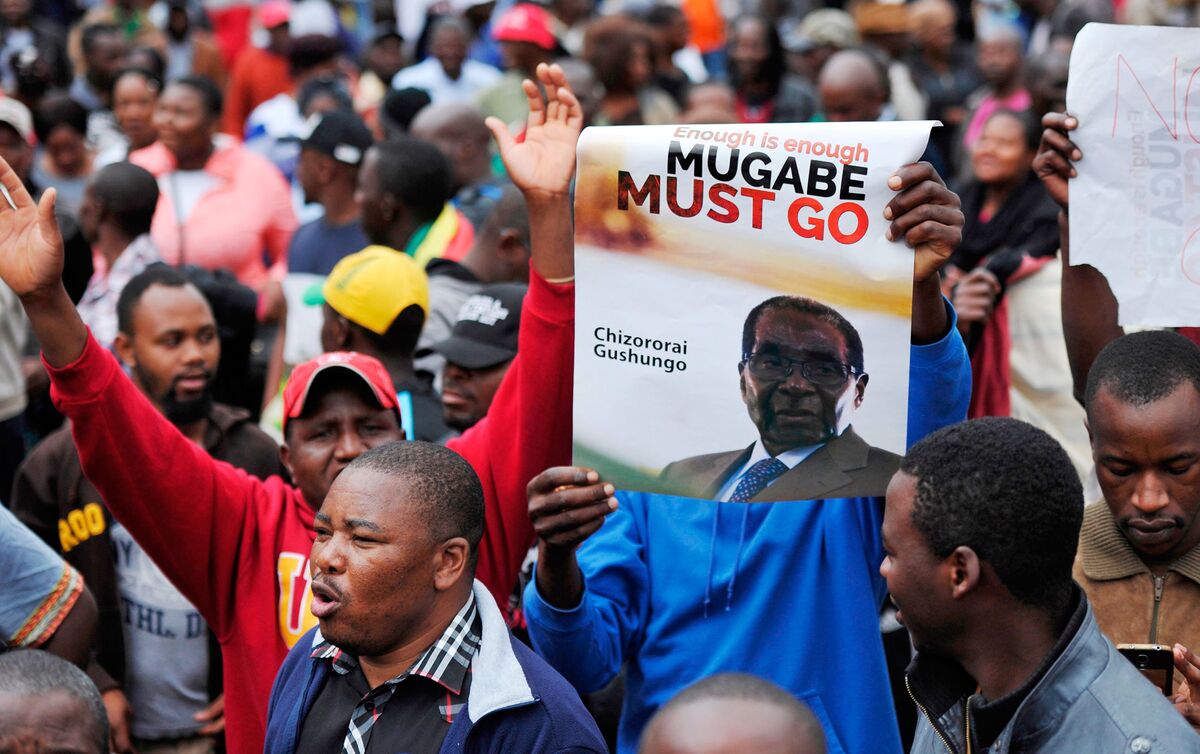
Robert Mugabe’s 37-year grip on political power in Zimbabwe is all but over.
The ruling party’s 10 provincial co-coordinating committees resolved late Friday to oust the 93-year-old president, a decision that’s set to be ratified by its central executive as early as this weekend. The nation’s parliament is due to reconvene on Tuesday and could impeach him should he refuse to resign.
Mugabe should be “recalled as the party president and be allowed to retire and be given his status as an elder statesman,” the Zimbabwe African National Union-Patriotic Front’s provincial committees said in a statement. “The provinces urges the central committee as the supreme organ of the party to urgently meet and give effect to these resolutions.”
The party’s move against Mugabe came just two days after the military placed him under house arrest and detained top officials who’d backed his wife, Grace, to succeed him. Mugabe insisted that he remains the country’s legally elected chief and refused to quit or to reinstate his fired deputy, Emmerson Mnangagwa. His swift and legal exit will enable the military to implement its plan to install a transitional government to oversee the country until elections can be held without the risk of outside intervention.
“This is a man who, for nearly four decades did whatever he liked,” said Eldred Masunungure, a political-science professor at the University of Zimbabwe. “We have to understand the psychological trauma this must be for him. But his time is definitely up. It’s not about if, but when. ”
Mugabe has held power in Zimbabwe since the end of white minority rule in 1980. Under his watch, the economy imploded, leaving an estimated 95 percent of the workforce unemployed and forcing as many as 3 million people into exile. Most Zimbabweans will celebrate his exit.
A rally in support of the military’s intervention has been called for Saturday and crowds began gathering from early morning, chanting: “He must go.” Some people draped themselves in the national flag and others blared their car horns.
The military stepped in after Mugabe fired long-time ally Mnangagwa as vice president in a move that could have paved the way for his 52-year-old wife and her supporters to gain effective control over the ruling party. Nicknamed “Gucci Grace” in Zimbabwe for her extravagant lifestyle, she said on Nov. 5 that she would be prepared to succeed her husband. The military denies having orchestrated a coup, and says it is only targeting criminals close to the president who are damaging the country.
The ruling party’s provincial committees singled out Finance Minister Ignatius Chombo, Higher Education Minister Jonathan Moyo and Saviour Kasukuwere, the party’s political commissar, and said they should be expelled.
Mnangagwa, the fired deputy, is a leading contender to head the transitional government, which may include opposition figures, according to two people with knowledge of the situation, who declined to be identified because they aren’t authorized to comment.
Read more on Zimbabwe’s power brokers
Opposition leader Morgan Tsvangirai said he hadn’t been approached by the military rulers for talks on a transitional government, adding that he’s prepared to meet with them. The military intervention resonated with the national public sentiment and was irreversible, and steps should now be taken to restore democracy in the country, he said in a statement on Friday.


0 comments:
Post a Comment